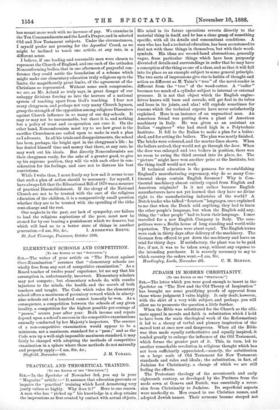PRACTICAL AND THEORETICAL TRAINING.
r To THE EDITOR OF THE "SPECTATOR.] SIR,—In the Spectator of November 3rd, you say in your "Magazine" article :—" It assumes that education prevents or impairs the ' practical ' training which Lord Armstrong very justly values so highly. Why does it P" Here is one reason. A man who has "picked up" his knowledge in a shop retains the impressions as first created by contact with actual objects. His mind in its future operations reverts directly to the material thing in itself, and he has a dear grasp of something specific, with all its details and concomitant conditions. A man Who has had a technical education, has been accustomed te deal not with these things in themselves, but with their word- symbols. His ideas are second-hand abstractions, generally vague, from particular things which have been purposely- divested of details and surroundings in order that he may have- a conception of the thing as one of a class, and so that it will fall into its place as an example subject to some general principle. The two sorts of impressions give rise to habits of thought and action as different as M. Taine's " tree " of the novel-reader is different from the " tree " of the wood-cutter. A " boiler " becomes too much of a cylinder subject to internal or external pressure. It is not that object which the English engine. driver knows will burn and corrode, will get foul in its tubes- and loose in its joints, and alas ! will explode sometimes for- reasons which the technical experts have never satisfactorily explained. Here is an instance of an impractical man. An American friend was putting down a plant of American machinery in Italy. He was given as an assistant an Italian " engineer " who had stood high in a Polytechnic Institute. It fell to the Italian to make a plan for a boiler- shed, and for setting the boilers. The plan was neatly finished. The bricks were coloured, and the mortar-lines shown. When the boilers arrived, they would not go through the door. When the door was enlarged and two boilers in position, there was no room to swing the third around into its place, &c. The " picture " might have won another prize at the Institute, but the thing itself would not work.
If technical education is the panacea for re-establishing England's manufacturing supremacy, why do so many Con- tinental shops contain English foremen ? Why is Con- tinental machinery almost entirely copied from English and American originals ? Is it not rather because English manufacturers have not yet learned that they have no divine- right to the manufacturing industries of the world ? A Dutch trader who talked "fourteen "languages, once explained to me that when the Dutch sold anything, they had to learn the other people's language, but when the English sold any_ thing, the "other people" had to learn their language. I once travelled for a new English Company in Italy. The com- petitors were a Berlin house of long standing and world-wide reputation. The prices were about equal. The English terms were cash in thirty days after delivery of the machinery. The German firm offered to put down the machinery and leave on trial for thirty days. If satisfactory, the plant was to be paid for; if not, it was to be taken away, without any expense to the intending purchaser. It is scarcely necessary to say to- which country the orders went. —I am, Sir, Heculingley, Leeds, November 4th. C. H. BENTON.






































 Previous page
Previous page